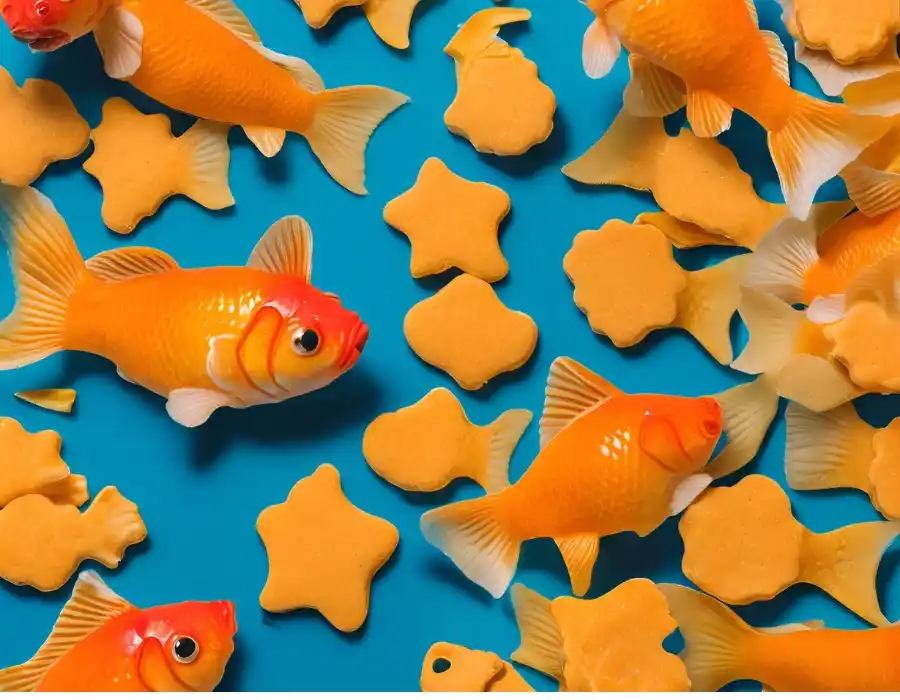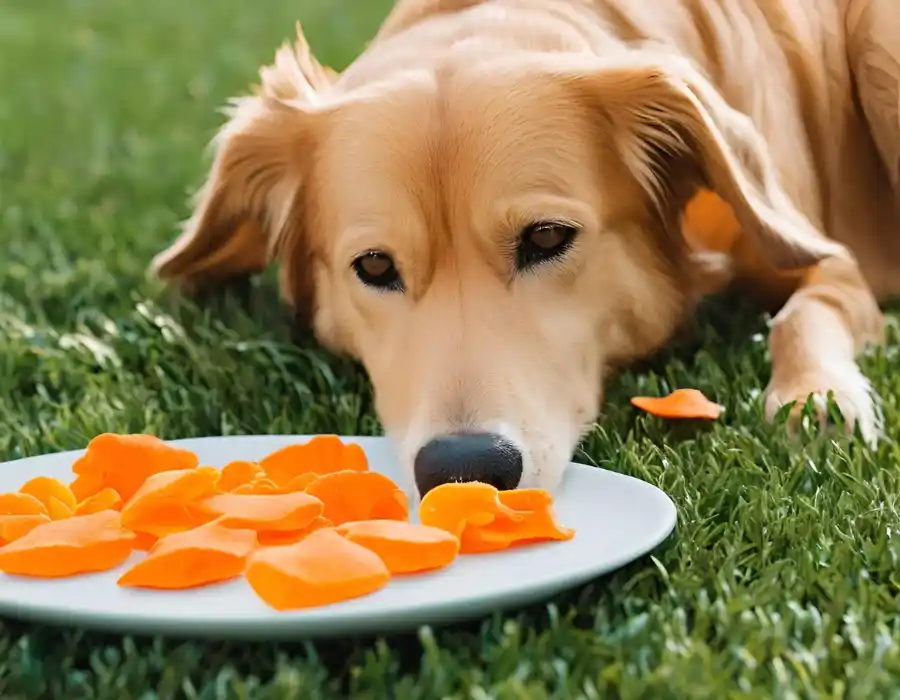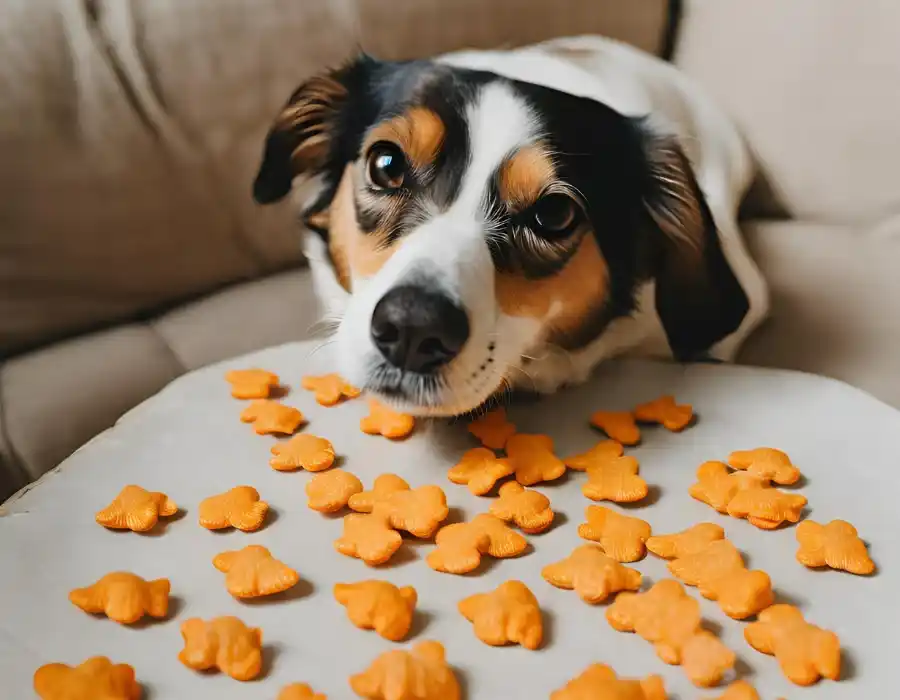Can dogs eat Goldfish crackers? Learn about the risks, potential health issues, and safer alternatives. Discover why these popular snacks aren’t ideal for your furry friend and explore healthier options to keep your dog happy and healthy.
Goldfish crackers are a staple in many households. They’re fun, tasty, and easily accessible, making them a favorite snack for both kids and adults. However, if you’re a dog owner, you might find yourself wondering: Can dogs eat Goldfish crackers too?
As a responsible pet owner, it’s important to be aware of what’s safe for your furry friend to eat. While it might seem harmless to toss your dog a couple of Goldfish crackers, there are some critical things you should know before sharing your snack with your canine companion.
What Are Goldfish Crackers?
Goldfish crackers, produced by Pepperidge Farm, are small, fish-shaped cheese crackers that have been around since the 1960s. They come in various flavors, but the classic cheddar flavor is the most popular. The ingredients typically include enriched wheat flour, cheddar cheese, salt, and some seasonings.
They’re marketed as a healthier snack compared to chips or other processed snacks, but what does this mean for dogs?
Understanding the ingredients in Goldfish crackers is the first step in determining if they’re safe for dogs. Wheat flour, cheese, and salt may not seem like a big deal to us, but for dogs, these ingredients can have different implications.

Are Goldfish Crackers Safe for Dogs?
The simple answer is that while Goldfish crackers are not toxic to dogs, they are not particularly safe or healthy for them either. Let’s break down the key ingredients:
- Wheat Flour: Dogs can have wheat, and most commercial dog foods contain some form of wheat. However, some dogs may have allergies or sensitivities to wheat, leading to symptoms like itching, digestive issues, or ear infections.
- Cheese (Cheddar): Many dogs enjoy cheese, but cheese in large amounts isn’t ideal for dogs. Cheese is high in fat and can lead to weight gain and digestive upset, especially in dogs that are lactose intolerant.
- Salt: Salt is where things get tricky. While dogs need some salt in their diet, too much salt can lead to excessive thirst, dehydration, and even sodium poisoning in severe cases.
- Artificial Additives: Some flavors of Goldfish crackers contain artificial colors, preservatives, and seasonings that aren’t suitable for dogs. While these additives might not cause immediate harm, they’re unnecessary and could contribute to long-term health issues.

Potential Health Risks
Even though Goldfish crackers aren’t directly poisonous to dogs, they carry several risks that could harm your pet. Here’s a closer look at the potential health risks:
1. Salt Content
Goldfish crackers contain a significant amount of salt, which can be dangerous for dogs. Dogs don’t handle salt as well as humans do. Too much salt can lead to excessive thirst and urination, which might result in dehydration. In extreme cases, consuming too much salt can lead to sodium ion poisoning. Symptoms of salt poisoning include vomiting, diarrhea, lethargy, tremors, and seizures. This is why it’s best to avoid salty snacks like Goldfish crackers altogether.
2. High Fat and Caloric Content
Goldfish crackers may be small, but they’re packed with calories and fat. If fed in excess, they can contribute to obesity, which is a major problem in dogs. Obesity can lead to a host of other health issues, such as diabetes, joint problems, and heart disease. While an occasional cracker might not cause immediate harm, regularly feeding your dog such snacks can have long-term consequences.
3. Digestive Issues
Cheese, one of the main ingredients in Goldfish crackers, can be tough on a dog’s digestive system, especially if the dog is lactose intolerant. Many dogs are sensitive to dairy products, and consuming them can lead to symptoms like diarrhea, bloating, and gas. Combine this with the wheat flour, and you have a recipe for digestive discomfort in dogs, particularly those with sensitivities.
4. Potential Allergies
Wheat and dairy are common allergens for dogs. If your dog is allergic to either of these ingredients, feeding them Goldfish crackers could trigger an allergic reaction. Symptoms of food allergies in dogs include itching, redness, digestive upset, and ear infections. If you suspect your dog has a food allergy, it’s best to consult with your veterinarian.

What to Do If Your Dog Eats Goldfish Crackers
Accidents happen, and if your dog has managed to get their paws on some Goldfish crackers, don’t panic. In most cases, a small amount won’t cause serious harm. However, there are a few steps you should take:
- Monitor Your Dog: Watch for any signs of discomfort or illness, such as vomiting, diarrhea, excessive thirst, or lethargy. These could be signs that your dog is reacting poorly to the snack.
- Provide Water: Make sure your dog has access to plenty of fresh water. The salt in the crackers may make your dog thirsty, so it’s essential to keep them hydrated.
- Consult Your Veterinarian: If your dog has consumed a large quantity of Goldfish crackers or is showing concerning symptoms, it’s best to consult your vet for advice.
Healthier Snack Alternatives for Dogs
While it’s best to avoid giving your dog Goldfish crackers, there are plenty of healthier alternatives that your dog will enjoy. Here are some ideas:
1. Carrots and Apple Slices
Crunchy and sweet, these fruits and veggies are a great low-calorie snack for dogs. They’re also packed with vitamins and minerals.
2. Dog-Specific Treats
There are many treats specifically made for dogs that are both tasty and healthy. Look for treats with natural ingredients and no artificial additives.
3. Homemade Dog Treats
If you love baking, why not make your own dog treats at home? There are many simple recipes available that use dog-friendly ingredients like pumpkin, peanut butter (unsweetened and free of xylitol), and oats.
4. Plain Popcorn
Unsalted, unbuttered popcorn can be a fun treat for dogs. It’s low in calories and provides a satisfying crunch.

Conclusion
In summary, while Goldfish crackers aren’t toxic to dogs, they’re not a good snack choice either. The high salt content, fat, and potential allergens make them a poor option for your furry friend. Instead, opt for healthier alternatives that provide nutritional value without the risks. Remember, your dog relies on you to make safe and healthy food choices for them.
The next time you’re enjoying a bowl of Goldfish crackers, think twice before sharing them with your dog. They might give you those irresistible puppy eyes, but their health is more important than indulging in a salty snack.
FAQs
Can dogs eat flavored Goldfish crackers (like pizza or pretzel flavor)?
No, flavored Goldfish crackers are even worse for dogs because they contain additional seasonings and artificial ingredients that could be harmful.
How much Goldfish cracker consumption is dangerous for a dog?
A small amount (like a couple of crackers) might not cause immediate harm, but regular consumption or a large quantity can lead to serious health issues. It’s best to avoid them altogether.
Are there any dog-friendly alternatives to Goldfish crackers?
Yes, there are plenty of dog-friendly treats that are safe and healthy, like plain popcorn, carrots, or dog-specific snacks.
